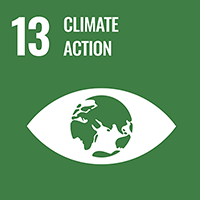Resilience to the impacts of climate change saves lives
Climate change is a global phenomenon that creates a chain of societal, environmental, and economic effects, and to mitigate the impacts, we need action on many levels of society. Climate change increases extreme weather, and the importance of reliable observations and forecasts to protecting lives and infrastructure is constantly growing. United Nations has set Climate Action as one of its Sustainable Development Goals (SDG 13), calling for climate awareness and adaptive capacity to climate hazards, for instance. In these respects, it is truly one of the goals most entwined with Vaisala.

Weather affects all of us every day. Vaisala works together with nearly all meteorological institutes in the world, supporting them in providing accurate, real-time information and forecasts on weather all around the globe. Weather observing systems provide reliable observations that likewise support reliable weather forecasts. Automatic sounding systems enable flexible remote soundings, and national weather services can extend their coverage even to remote and hard-to-reach locations. Also safe traffic is dependent on accurate weather observations on the ground, in the air, and at sea.
A more extreme example of our link to Climate Action is, quite literally, extreme weather. Vaisala’s hurricane-tracking dropsondes can make in situ measurements inside a hurricane, providing essential information for forecasting its path and intensity. Vaisala also helps its customers to establish weather observation networks and build up capabilities that improve their capacity to predict extreme weather. Our aim is to help nations to become more resilient to climate change through top-of-the-line environmental observations, forecasting, and early warning systems. This advance information helps to safeguard both lives and infrastructure, as has been the case in The Bahamas.
Helping The Bahamas adapt to the changing climate
Extreme weather events can have devastating consequences on local economies and livelihoods, especially in developing nations. Thus Vaisala collaborates with international funding agencies and weather experts to build capacity for weather observing networks and competence in developing economies. This way we help them to be better prepared for extreme weather and its impacts on different levels of society and economy.
The Bahamas is an archipelago with some 700 islands in the Caribbean, where severe weather has become more frequent over recent years. As a low and flat archipelago with geographically varying weather events, The Bahamas is prone to a rise in sea level, heavy rains, flooding and intense storms, including hurricanes that usually take place from to June to late November. To keep people safe, forecasting capabilities and preparedness are key elements, which is why The Bahamas decided to invest in a nation-wide weather observation, forecasting and, alerting solution by Vaisala in 2016. Thanks to an improved meteorological infrastructure, early warnings can be issued ahead of storms, helping people and organizations be prepared and ensure that there are supplies and shelters available.
Supporting The Bahamas in building up this modern weather forecasting network that covers the whole country, Vaisala provides the island nation with, for example, four new weather radars, upgrade to an existing weather radar, nine Automatic Weather Observations Systems (AWOS), sixteen Automatic Weather Stations (AWS), and related services such as training. Vaisala's weather radar is the most effective instrument to observe rainfall as well as to monitor hurricanes and tropical storms, and AWOS is a solution designed for airports, fully compliant with the standards of the International Civil Aviation Organization (ICAO). Trainings and meteorological software, designed for easy production and dissemination of forecasts and alerts, are delivered together with the Finnish Meteorological Institute. The improved forecasting will help keep citizens, numerous visitors as well as property safe from the ravages of extreme weather.
Vaisala had installed six out of the agreed nine AWOS and three out of the five weather radars by September 2019, when these systems were put to an extreme test, as Hurricane Dorian stormed The Bahamas. Afterwards three of Vaisala’s AWOS were still in place and operational, proving that they can withhold the severe conditions. To help the nation to recover from the disaster, Vaisala has donated three new AWOS to replace the destroyed ones.
“The islands suffered significant damage due to the storm. With the help of our solutions, more accurate information and alerts could be sent out, enabling thousands of citizens and organizations to prepare for and seek shelter from Dorian. If the hurricane hadn’t been well monitored, the consequences could have been much worse. Thanks to the extensive training and our five year maintenance contract, The Bahamas can prepare for such events also in the future,” says Aleksis Kajava, Head of Latin America, Vaisala.
Our agreement with Ethiopia in the fall of 2019 marks another more recent example of such climate action as well as meteorological infrastructure and capability development projects. The case of Dorian is a true example of how important the weather systems provided by Vaisala are for our customers.
***
This is the second post in our article series about Vaisala’s commitment to the UN Sustainable Development Goals. Vaisala’s multifaceted business is brimming with stories, and in this article series, we illustrate with concrete examples, how our business is truly linked to the SDGs. Stay tuned for more information on how our solutions, practices, and mission Observations for a better world reflect the goals.



Add new comment